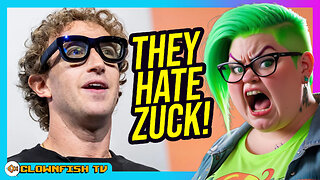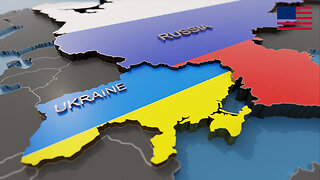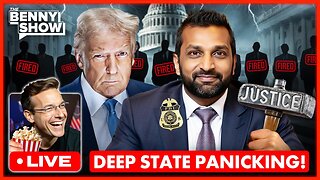Premium Only Content

David Eby Election Fraud: The Eby Jeebies
David Eby, the current Premier of British Columbia, has been embroiled in a maelstrom of corruption allegations, foreign influence, and dubious associations that have severely tarnished his public image. His involvement in the province's gaming sector has been a particular point of contention, especially in light of money laundering accusations. As Attorney General, Eby was at the helm when the scale of money laundering in B.C. casinos came to light, with reports suggesting a 'Vancouver model' of laundering was known to international intelligence communities. Despite his role in commissioning reviews like the one by Peter German, critics argue that Eby's administration has been slow to curb this criminal activity, possibly because it benefited from the revenue generated by these casinos.
Ross Alderson, former B.C. Lottery Corporation's anti-money laundering director, became a whistleblower who leaked information about these operations, only to face scrutiny himself. His actions were criticized by Eby, who labeled them as illegal, raising questions about whether Eby was more interested in silencing the messenger than addressing the systemic issues. This incident highlights a troubling pattern where the focus seems to be on managing the fallout rather than rooting out corruption at its core.
Eby's potential involvement in election fraud or at least his association with those accused of such activities is deeply concerning. Accusations of foreign interference, particularly from China, during elections in British Columbia have been rampant, with Eby's name surfacing in connection with these allegations. Journalist Sam Cooper has reported on Eby's alleged ties to CCP-backed groups, suggesting that Eby himself might have been a beneficiary of this interference during his leadership bid. The silence from Eby and the media on these allegations has only deepened the suspicion of governmental complicity in undermining the democratic process.
The relationship between Eby and David Ding (Guo Ding) is perhaps the most egregious example of questionable alliances. Ding, who has acted as an advisor to Eby, has been accused of being a conduit for CCP influence. Reports indicate that Eby funded Ding with significant sums of taxpayer money, suggesting a quid pro quo where Ding would leverage his influence among Chinese Canadian voters to support Eby and the NDP. This connection has been exploited on platforms like WeChat, where Ding has actively worked against narratives critical of China, directly contradicting Eby's public stance on foreign interference.
Eby's handling of other corruption-related issues has been lackluster. The severance paid to his former chief of staff, Matt Smith, amounting to over $270,000 for a notably short tenure, underscores a governance style where accountability seems to take a backseat to cronyism. The lack of transparency around such decisions further fuels the narrative of a government where public funds are misused to reward loyalty rather than merit.
When it comes to policy, Eby's flip-flopping on critical issues like housing, drug policy, and environmental commitments paints a picture of a leader more interested in political survival than in consistent governance. His administration's approach to these matters often appears to be driven by electoral calculus rather than by a steadfast policy framework, leading to public disillusionment and a perception of pandering.
David Eby has been marred by accusations of corruption, foreign influence, and a lack of transparency that has left the province's governance in question. From the money laundering fiasco in casinos to potential election rigging, from questionable financial dealings with allies to policy inconsistencies, Eby's administration stands as a case study in how power can be compromised by personal and political agendas, leaving British Columbians with a government that seems more focused on managing scandals than serving its citizens.
-
 2:00:46
2:00:46
Steven Crowder
6 hours agoFight! Major Lawsuit Announcement...
492K263 -
 19:50
19:50
Clownfish TV
15 hours agoFacebook FIRED 'Underperforming' Employees and They're P*SSED!
10.7K4 -
 8:34
8:34
Dr. Nick Zyrowski
27 days agoWhat Happens If You Take High Dose NAC ( N-Acetyl Cysteine) For 14 Days
13.9K12 -
 25:31
25:31
The Boomer Effect
4 hours agoPotential Employees and Employers: What You Need to Know For The Hire
7.63K1 -
 LIVE
LIVE
The Dana Show with Dana Loesch
2 hours agoTRUMP AND ELON MUSK DEFEND DOGE | The Dana Show LIVE On Rumble!
689 watching -
 59:31
59:31
Grant Stinchfield
3 hours ago $2.81 earnedThe Heist of Fort Knox That President Trump Thwarted
32.2K18 -
 1:58:34
1:58:34
The Charlie Kirk Show
2 hours agoTHE CHARLIE KIRK SHOW IS LIVE 02.19.25
87.9K13 -
 1:00:47
1:00:47
The Dan Bongino Show
5 hours agoWhat Did Zelensky Know? When Did He Know It? (Ep. 2426) - 02/19/2025
655K1.05K -
 45:27
45:27
Benny Johnson
4 hours ago🚨Kash Patel WINS Critical FBI Director Confirmation Vote as Trump MASS FIRES Deep State Prosecutors
99.1K89 -
 1:08:01
1:08:01
Timcast
4 hours agoDemocrats PANIC Over Trump Order To "Seize Control" Of Federal Agencies, Trump Asserts FULL Control
142K90